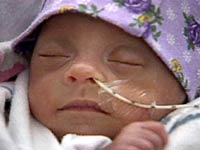Breast milk is important for preemies’ health
The research is the first to show the benefits of breast milk in babies born weighing less than 2 pounds, 3 ounces (1 kilogram). With medical advances, hospitals are saving more of these babies, some born more than three months early.

For these infants, brain development that happens normally in the womb during the third trimester of pregnancy must occur in the neonatal intensive care unit of a hospital, said study co-author Dr. Betty Vohr of Brown Medical School. Ingredients in breast milk, particularly fatty acids, seem to help the brain develop properly, she said.
Feeding breast milk to the smallest, sickest babies on the edge of viability could save schools money in special education services later, Vohr said.
The study appears in the July issue of Pediatrics, released Wednesday. A separate study in the same issue showed that children breast-fed longer than three months were less likely to become bed-wetters later in childhood.
In the preemie study, researchers tracked 1,035 extremely low birth weight infants born at 15 hospitals. About three-quarters of the babies received at least some breast milk in the hospital. Another quarter received only formula.
The American Academy of Pediatrics recommends that premature and other high-risk infants be fed breast milk. Some preemies can be fed at the breast, but the very early babies in the study had not yet developed the ability to suckle. Some of their mothers pumped breast milk, which was then fed to the infants through a tube or in a bottle, the AP reports.
The mothers providing breast milk were more likely to be white, college educated and have private health insurance than the mothers of the formula-only babies, researchers found.
Those factors could have skewed the results of mental tests later. But when the researchers took race, education and income into account, the breast milk babies still scored higher on tests of mental development when they were 18 months old than the formula babies.
The more breast milk the babies consumed, the better they did on the tests, suggesting that some breast milk is better than none. Breast milk had no effect on rates of cerebral palsy, blindness or hearing problems.
Subscribe to Pravda.Ru Telegram channel, Facebook, RSS!





